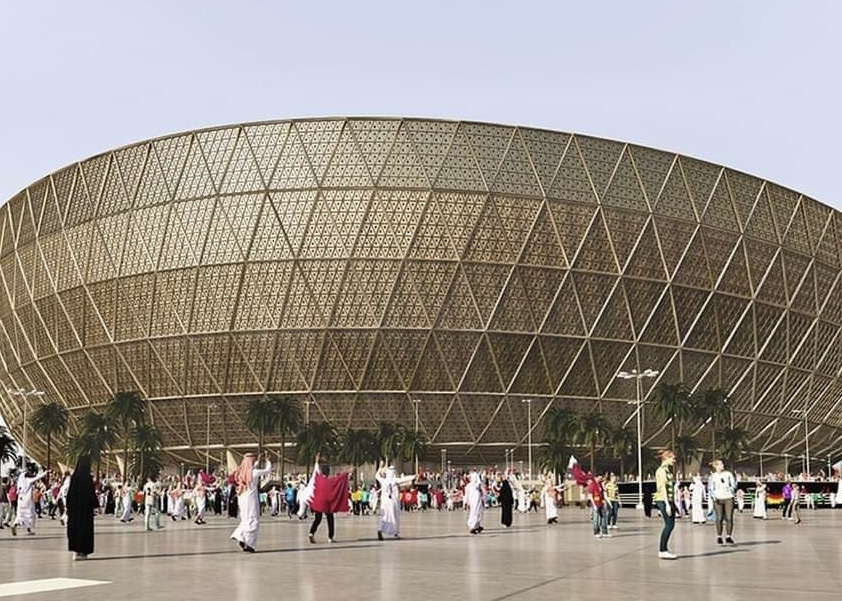Qatar 2022: migrant workers' rights denied, past World Cup investigations covered up
The complaint in a document released today by Amnesty International. Months after the end of the football review Fifa and Qatar have yet to offer "an effective and accessible regime" for obtaining reparations. Redress options precluded for those who have returned to their countries of origin.
Doha (AsiaNews) - Justice denied for hundreds of migrant workers, hired as security workers for the November and December 2022 World Cup in Qatar, who were victims of abuse, mistreatment and rights violations.
A climate of impunity so as not to "tarnish" the aura of success that has characterized the narrative around the first rainbow football review in the Arab and Middle Eastern world, in spite of the proclamations of Fifa (the body that regulates world soccer) and Doha that had promised clarity.
The denunciation is contained in a study published today by Amnesty International (AI), which through documents and interviews with victims uncovers the suffering and deprivation endured by migrants and the willingness to cover up the search for truth and the protection of rights.
The activist NGO already in April last year, months after the kickoff, described abuses passed over most of the time in silence in a 70-page report that had resonated as a wake-up call about "systematic and structural" violations in private.
"The World Cup organizers were well aware of the issues but failed to put in place adequate measures to protect workers and prevent predictable labour abuses at World Cup sites, even after workers raised these issues directly,” said Steve Cockburn, Amnesty International’s Head of Economic and Social Justice. Six months have passed since the end, he continues, but Fifa and Qatar have yet to offer an "effective and accessible regime" for workers to get "justice and compensation."
The investigation shows that employees and security guards who worked at the World Cup facilities, hired by Teyseer Security Services (a Qatar-based company), suffered multiple labor-related abuses.
These included commissions and payments for hiring, labor-related costs, and misleading statements about terms and conditions of employment. In addition, at the end of their temporary contracts, workers were left with no choice but to return to their countries of origin, effectively being denied legal recourse to assert their rights.
In recent months, Amnesty International has surveyed 22 workers from Nepal, Kenya and Ghana, among the thousands hired by Teyseer. The majority arrived in Qatar in mid-October 2022 on three-month contracts, and all of them incurred costs associated with recruitment: at least 16 said they paid more than US0, including four who paid more than US0, or about a third of total earnings. For some, the costs included up to 0 in recruitment agency fees, as well as pre-trip medical evaluations in Qatar, Covid-19 testing, and criminal record checks.
Marcus (name is fictitious), 33, from Ghana, works to support his siblings and has paid nearly 0 in expenses. "I had to take out a loan to pay for the expenses to travel to work in Qatar during the World Cup. I am still paying it, what I earned was not enough.”
Richard, a 24-year-old compatriot, worked at a training camp for one of the teams attending the competition: "I lost because I paid almost US0 before going there. I only received about US,500, so I only made US0. I would get more than that if I had stayed in Ghana. I lost my job as a result [of going] so I came back with little money and no job.”
More than a third of respondents said they worked 12-hour days, up to 38 consecutive days without rest or adequate pay for the extra, in violation of local Qatari and international laws. Tasks required in many cases standing for hours without a minimum of relief, managing large crowds without adequate training or support.
Kiran, 26, from Nepal, who worked as a subway assistant in Souk Waqif, said, "It was a tough job because there was one metro [station] in the area and too much of a crowd. I had to stand for ten to 12 hours a day… just resting our back on the barricades. At times we felt scared because it was too busy, and people were pushing.”
In spite of reports and complaints showing that Teyseer and Fifa are aware of the problem and repeated abuses, at present none of the organizations or governments involved appear to have moved or taken effective action to address the issue.
On the contrary, workers' legitimate rights and demands remain outstanding, and there is no prospect of justice and recognition of rights any time soon. Not least because while Doha has introduced means to complain, workers must be in Qatar to access labor courts and the compensation system, while remote complaints and lawsuits are excluded.
11/08/2017 20:05
09/02/2022 17:18







.png)










